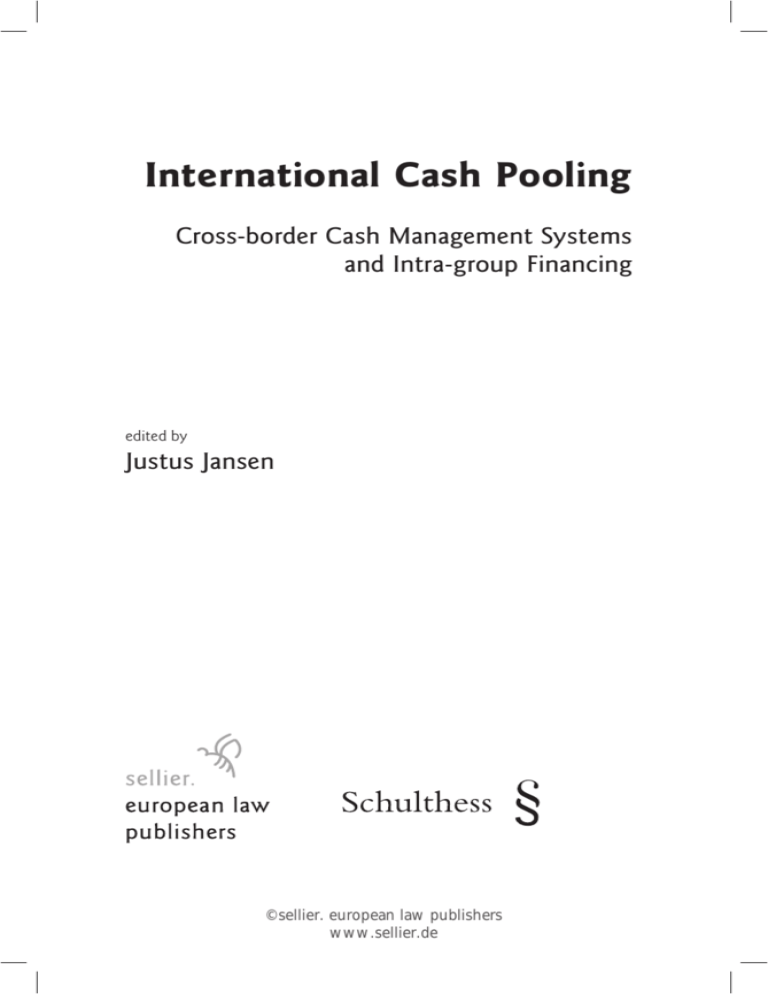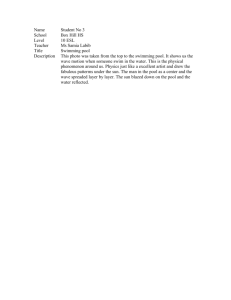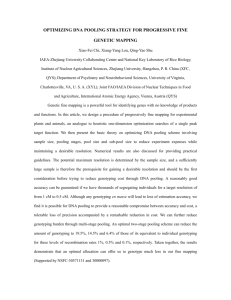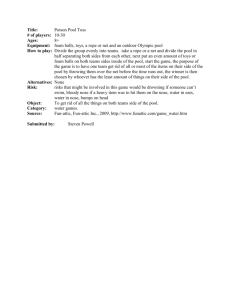
International Cash Pooling
Cross-border Cash Management Systems
and Intra-group Financing
edited by
Justus Jansen
© sellier. european law publishers
www.sellier.de
ISBN (print) 978-3-86653-192-5 (s.elp)
ISBN (eBook) 978-3-86653-949-5 (s.elp)
ISBN (print) 978-3-7255-6351-7 (Schulthess)
The Deutsche Nationalbibliothek lists this publication in the Deutsche Na­
tional-bibliografie; detailed bibliographic data are available on the Internet at
http://dnb.d-nb.de.
© 2011 by sellier. european law publishers GmbH, Munich.
All rights reserved. No part of this publication may be reproduced, trans­
lated, stored in a retrieval system or transmitted, in any form or by any means,
electronic, mechanical, photocopying, recording or otherwise, without prior
permis­sion of the publisher.
Production: Karina Hack, Munich. Typesetting: fidus Publikations-Service GmbH,
Nördlingen. Printing and binding: AZ Druck und Datentechnik, Kempten. Printed
on acid-free, non-ageing paper. Printed in Germany.
© sellier. european law publishers
www.sellier.de
192_Jansen_Cash Pool_titelei.indd 4
21.07.2011 12:52:19
International Cash Pooling
Justus Jansen
1.
International Cash Pooling
Globalization became a natural part of the world’s vocabulary. It is also well
known that companies and corporate groups need to manage their cash
flow. Out of these two common facts results something that is really worth
looking at: international cash pooling.
The task of a Chief Financial Officer (CFO) in a company or corporate
group is to manage financial risks and to optimise the financial situation
of the company or the group. This optimisation is done in multinational
corporations by cash management systems and in particular by way of
implementation of cross-border or multijurisdictional international cash
pools. Nonetheless, international cash pooling is a topic rarely reviewed.
In practise it is however wide spread as it is practiced by corporate groups
all around the world.
While setting up an international cash pool in a multinational corporate
group it is crucial to take all involved jurisdiction into account. For example, the legitimacy of necessary up- and downstream loans within a cash
pool needs to be assessed as well as questions of capital maintenance or
a potential liability for losses, just to name some of the many questions
arising when setting up a multijurisdictional cash pool. Cash pool systems therefore need to respect possibilities and barriers of company law,
insolvency law and banking law. In addition an optimised cash pool must
also take tax law requirements into account. The latter angle is not part of
this book.
This book provides an overview of the legal requirements in 15 different
countries when installing a cash pool system. It enables the reader to get
an idea of the chances and risks which will accompany a multijurisdictional cash pool system involving the jurisdictions of his choice. It draws
his attention to crucial requirements, provisions and issues, which are most
important to deal with in the chosen configuration.
1
© sellier. european law publishers
www.sellier.de
192_jansen_cashmanagement.indd 1
21.07.2011 12:24:51
International Cash Pooling
1.1
Cash management systems
The term cash management systems describes different systems of financing
in companies and corporate groups. Although the term seems to be very
broad, it really covers only two models for liquidity optimisation. These
two models are cash pooling and netting. Cash pooling concentrates the
whole liquidity of the corporate group on a single bank account (physical
cash pooling) while netting describes the periodical settlement of all claims
and debts between the companies of the corporate group.
Due to the international nature of today’s business and the international
structure of corporate groups, parent companies and subsidiaries from all
around the world are involved in cash management systems. From a technical point of view, cash management systems involving companies from
different countries are easily practicable by way of electronic banking. Even
different currencies can be handled: they can be pooled separately or may
even be converted into one corporate currency within a multicurrency
cash pooling system.
Apart from cash pooling there is one main different cash management system: so called netting, a process to settle the existing claims and debts between the companies in a corporate group. Netting gives the parent company
of the corporate group an insight on supply relationships and other important information of transactions within the group. It also helps to reduce the
costs for bank transactions. However, this book covers only cash pooling.
1.2 Different types of cash pooling
The different types of cash pools which are applied in practice are multifold. A first distinction must be made between physical and virtual (notional) cash pooling.
The main goal of virtual cash pooling is to optimise the interest rates which
different companies within one corporation need to pay or may earn for
their funds on their respective bank accounts. In case of virtual or notional cash pooling an actual transfer of cash does not take place. The funds
(credit or debit) on the accounts of the virtual cash pool members are not
transferred or balanced and remain untouched. The interest rate for the
funds is however calculated on the notionally netted balance of all participating sub accounts.
Justus Jansen
2
© sellier. european law publishers
www.sellier.de
192_jansen_cashmanagement.indd 2
21.07.2011 12:24:51
1. International Cash Pooling
In contrast, in case of a physical cash pool, the funds on the bank accounts
of all participating cash pool members are transferred to one master account which is usually held by the parent company of a corporate group or
a specially set up separate (holding) company.
As a basic example for physical cash pooling the so called zero-balancing
shall be explained.
In a zero-balancing cash pool all subsidiaries transfer their entire surplus
cash on a regular basis (e.g. every day at midnight) to a master bank account of the parent company. The parent company in return transfers cash
to all the subsidiary companies whose (slave) accounts have a debit in order
to balance them out. The following picture shall visualise this basic cash
pool system:
Physical Cash Pooling
(zero-balancing)
parent company
MasterAccount
surplus cash
amount in deficit
surplus cash
subsidiary company A
subsidiary company B
subsidiary company C
liquidity (+)
liquidity (-)
liquidity (+)
slave account
slave account
slave account
It is also possible to only transfer cash from the subsidiary companies, if
their balance exceeds a set amount and just transfer money to the subsidiary companies, if their balance undercuts this set amount. Such a system
is called target-balancing.
Another possible cash pool system is the so called on-line customer-initiated account transfer system. Authorized representatives of the account
holder or parent company have on-line real time access to the balances to
Justus Jansen
3
© sellier. european law publishers
www.sellier.de
192_jansen_cashmanagement.indd 3
21.07.2011 12:24:51
International Cash Pooling
the participating accounts and can initiate credit and debit transfers electronically on an as-needed basis. Typically the bank simply acts as a conduit for the funds and has no right of set-off or appropriation against the
account balances. One advantage of such an arrangement is that it allows
the corporate customer to exert more control over cash-flows on as-needed
basis than would be available through a zero balancing or daily sweep arrangement. A disadvantage is that more administrative resources must be
allocated to monitor the cash needs of particular subsidiaries or business
units, which may not be practicable in a large, complex corporate group.
Single legal account (also known as group account or balance netting)
pooling, is a further type of cash concentration. This solution is based on
a single, external bank account where all physical payments take place.
Typically, the holder of a group account is the parent company or an incorporated separate funding unit. Other participants in the cash pool arrangement, such as subsidiary companies, deposit and withdraw assets
to and from the group account through their individual virtual reference
accounts (also referred to as transaction accounts), where the payments
of each participant are mirrored. Hence, each legal entity will perceive the
solution as if they have had their own physical bank account. When setting
up a single legal account pooling, the old bank accounts of each subsidiary
are usually closed and the monies are transferred to the group account.
In connection with such transfer the transaction accounts can maintain
the same old account numbers as the old physical bank accounts. This
facilitates the transition phase as the subsidiaries’ interest groups do not
need to be informed about any new account numbers. Usually it is offered
as single currency arrangement, but also a multicurrency element can be
incorporated if needed.
1.3 Chances and Risks of Cash Pooling
Many advantages can be achieved by a well set-up international cash pool.
Not only does it enable a corporate group to minimise its expenditure for
banking services, but mainly it is an important tool to guarantee for a filled
war chest for possible future transactions. Only if the maximum financial
strength of a corporate group is bundled, a holding company might be able
to react quickly enough to market opportunities or threats.
Cash pooling is applied by companies and corporate groups because of
its diverse advantages. As cash pooling gathers all liquidity in a corporate
Justus Jansen
4
© sellier. european law publishers
www.sellier.de
192_jansen_cashmanagement.indd 4
21.07.2011 12:24:51
1. International Cash Pooling
group onto one bank account, the parent company receives information on
the cash flow of the single corporate group members and can detect problems such as non-profitable companies faster. Further, existing banking
contacts can be reduced and streamlined to a necessary minimum; better
conditions can be negotiated with the bank (or banks) which will be used
for the cash pool system. This leads for example to minimisation of the
costs for loans from the respective bank for each of the group members.
Moreover, cash pooling creates an optimal capital allocation. This helps to
use dead capital in other business areas which are more profitable. In addition, a cash pool system optimises the interest income of the corporate
group.
However, there are also disadvantages which come with cash pooling.
Particularly the participants of a cash pool which give their surplus cash
away have disadvantages. Subsidiaries which do not have own liquidity
and take up loans from the pool leader do not enter any risks. Conversely,
the subsidiaries which pay their liquidity to the pool leader bear the risk
of not being paid back. This risk does not only exist because of the risk of
crisis and insolvency of the parent company, but also because of the risk of
crisis and insolvency of several subsidiaries which then need liquidity. In
addition, those subsidiaries giving liquidity to the cash pool might not get
as high interest rates for these intra-group loans as if they invested their
liquidity by themselves.
1.4 Cash Pool Agreement Structure
When setting up a cash pool, different agreements have to be concluded.
There is the cash pool agreement which is concluded between the participants of the cash pool and there is the agreement between the participants
and the respective bank (or banks). The cash pool agreement includes all
terms and conditions necessary to define and shape the cash pool system.
The agreement with the respective bank contains all provisions for the
keeping of the accounts as well as special provisions for the operation of
the cash pool system.
Justus Jansen
5
© sellier. european law publishers
www.sellier.de
192_jansen_cashmanagement.indd 5
21.07.2011 12:24:51









